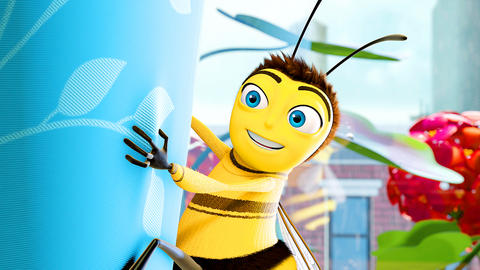Bees rarely fly in a straight line. They hover and zigzag, with a purpose known only to the collective brain of the hive. The most genuinely apian aspect of Bee Movie, DreamWorks' new animated movie about, well, bees, is that it spends a lot of its short running time buzzing happily around, sniffing out fresh jokes wherever they may bloom. There is a plot - the usual big, elaborate story with the usual important messages about saving the planet, living together in interspecies harmony and believing in yourself - but it's a little beside the point. The real fun is the insect shtick.
The DreamWorks Animation formula, exemplified in the mighty Shrek franchise (and imitated by would-be rivals at Sony and Fox), is to charm the children with cute creatures and slapstick action while jabbing at the grown-ups with soft, pseudosophisticated pop-cultural satire. Bee Movie, directed by Simon Smith and Steve Hickner and animated by several hundred industrious drones, pushes this strategy almost to the point of dispensing with the kid stuff altogether.
There are a few splendid cartoon set pieces - including a funny, thrilling bee's-eye tour of New York, from Central Park flora to the surface of a tennis ball to the inside of a speeding car - that show off the latest computer animation techniques. But most of the film's creative energy is verbal rather than visual, and semimature rather than strictly juvenile.

PHOTO: COURTESY OF UIP
Which is hardly surprising. As everyone knows by now, the leading man (and one of the screenwriters and producers) is Jerry Seinfeld, whose sitcom, almost a decade off the network air, lives on in syndication and in the endless recycling of memorable one-liners by a certain type of pathetic Gen-Xer. (Not me, though. I'm the complete opposite of every film critic you've ever met. I'm the master of my domain.)
Seinfeld provides the voice and attitude for Barry B. Benson, a young bee who has reached the stage in his accelerated bug lifestyle when he must choose a career. The hive where he lives is a highly regimented place, where the bees, conditioned by 27 million years of evolution, work without a break in the same job for their whole lives. Visually, this world resembles a sweet, sunny, corporate version of Fritz Lang's Metropolis.
Barry's nerdy pal, Adam (Matthew Broderick), accepts his drone future as part of the natural order of things, but Barry is a maverick, an individualist yearning to break out of the conformist world of the social insects.

PHOTO: COURTESY OF UIP
He may also remind some viewers of Benjamin Braddock, the alliteratively named hero of The Graduate, a film that Bee Movie cites in a few amusing scenes. Not that Barry has an affair with a middle-aged mama bee (all bees are children of the queen, a biological fact the film notes only in passing). Instead he flies even farther from the nest, so to speak, falling in love with an actual human being, a Manhattan florist named Vanessa who speaks in the irresistibly sweet voice of Rene Zellweger.
When you stop to think about it, the prospect of romance between a bee and a person raises some potentially awkward, not to say physiologically outlandish, questions. But of course you're not supposed to think about it. The moral of the story - one of them, anyway - is that we and the bees are interdependent and that we should respect their hard work.
This lesson is satirically driven home in a courtroom plot that erupts just as the love story starts to get sticky. When Barry discovers that honey is sold in supermarkets, and that it is harvested from captive bees held in smoky, shoddy fake hives, he sues the human race, going after some of its notorious bee abusers. These include Ray Liotta, who sells his own brand of honey, and Sting, whose name is obviously offensive to bees. (Both celebrities make cameo voice appearances, as does Larry King, playing a character called Bee Larry King. It's funnier than it sounds. Or maybe it's exactly as funny as it sounds.)
Even when playing an animated bee, Seinfeld does not demonstrate great emotional range. His comfort zone as a performer ranges from peeved to perplexed to moderately psyched, with occasional bursts of obvious exaggeration to indicate that he is at least aware that more intense states of feeling exist. But his detachment works in the movie's favor by defusing its sentimental impulses.
Perhaps because of its star's background in stand-up comedy, Bee Movie makes overt a conceit that is usually left implicit in animal-kingdom cartoons, namely that species is the cartoon version of ethnicity. Barry and his tribe are not just bees. They identify as "Beeish" - I'm sure "Benson" was something else back in the old country - and worry about their children dating wasps. On his travels Barry meets a mosquito who speaks in the voice of Chris Rock and who refers to his despised and misunderstood brethren as "bloods."
These riffs on identity politics give Bee Movie an extra fillip of comic vitality in an otherwise soft and fuzzy entertainment.

May 26 to June 1 When the Qing Dynasty first took control over many parts of Taiwan in 1684, it roughly continued the Kingdom of Tungning’s administrative borders (see below), setting up one prefecture and three counties. The actual area of control covered today’s Chiayi, Tainan and Kaohsiung. The administrative center was in Taiwan Prefecture, in today’s Tainan. But as Han settlement expanded and due to rebellions and other international incidents, the administrative units became more complex. By the time Taiwan became a province of the Qing in 1887, there were three prefectures, eleven counties, three subprefectures and one directly-administered prefecture, with

It’s an enormous dome of colorful glass, something between the Sistine Chapel and a Marc Chagall fresco. And yet, it’s just a subway station. Formosa Boulevard is the heart of Kaohsiung’s mass transit system. In metro terms, it’s modest: the only transfer station in a network with just two lines. But it’s a landmark nonetheless: a civic space that serves as much more than a point of transit. On a hot Sunday, the corridors and vast halls are filled with a market selling everything from second-hand clothes to toys and house decorations. It’s just one of the many events the station hosts,

Among Thailand’s Chinese Nationalist Party (KMT) villages, a certain rivalry exists between Arunothai, the largest of these villages, and Mae Salong, which is currently the most prosperous. Historically, the rivalry stems from a split in KMT military factions in the early 1960s, which divided command and opium territories after Chiang Kai-shek (蔣介石) cut off open support in 1961 due to international pressure (see part two, “The KMT opium lords of the Golden Triangle,” on May 20). But today this rivalry manifests as a different kind of split, with Arunothai leading a pro-China faction and Mae Salong staunchly aligned to Taiwan.

Two moves show Taichung Mayor Lu Shiow-yen (盧秀燕) is gunning for Chinese Nationalist Party (KMT) party chair and the 2028 presidential election. Technically, these are not yet “officially” official, but by the rules of Taiwan politics, she is now on the dance floor. Earlier this month Lu confirmed in an interview in Japan’s Nikkei that she was considering running for KMT chair. This is not new news, but according to reports from her camp she previously was still considering the case for and against running. By choosing a respected, international news outlet, she declared it to the world. While the outside world